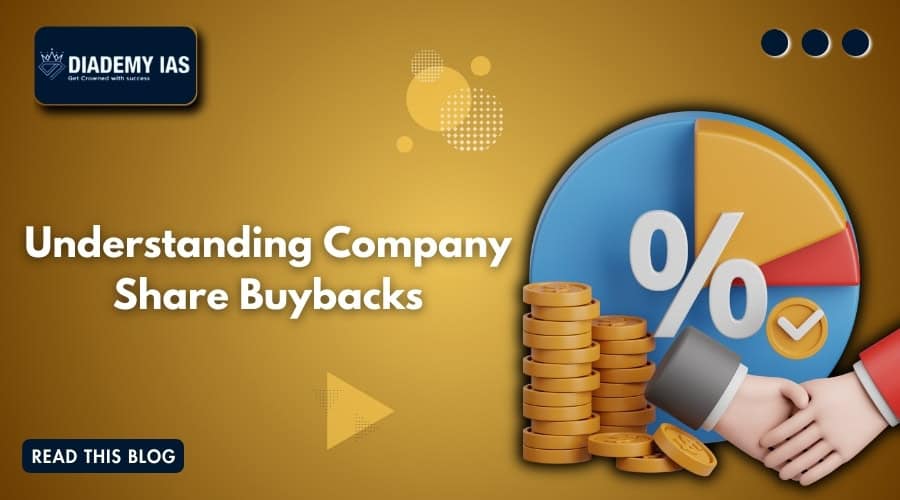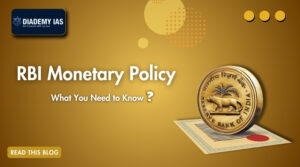Understanding Company Share Buyback: A Complete Guide
Looking to understand the ins and outs of company share buybacks? Diademy IAS walks you through the process step-by-step, making it easy to navigate this complex financial for a UPSC aspirant.

UPSC Commerce and Accountancy Optional
Question on Company Share Buyback was asked in UPSC 2023 Paper.
Table of Contents
Introduction to Share Buybacks
Have you ever wondered what it means when a company decides to buy back its own shares? This action is known as a buyback of shares. When companies do this, they purchase their own stock from the market. This can have a big effect on the company and its investors.
Knowledge on Share Buybacks!
Talk to Diademy IAS experts for more information on this topic.
What Are Share Buybacks?
In simple terms, a share buyback happens when a company buys its own shares back from the people who own them. Imagine a lemonade stand that decides to buy back cups of lemonade from its customers. When the lemonade stand buys those cups, there are fewer cups left for sale. This can help the stand show that it values its lemonade and wants to support its worth.
Why Do Companies Buy Back Shares?
Companies have several reasons for wanting to buy back their shares. First, when they reduce the number of shares available, it can make each remaining share worth more. This boosts the price of the shares, which is good for investors because it increases their investment's value. Second, buybacks can show that a company has extra money that it doesn’t need right away. This can help build trust with investors, as it shows the company is doing well financially. Overall, share buybacks can be a smart move for companies to improve their value and strengthen their relationships with their investors.
Also Read - Cost Accounting's Rising Relevance in India
Reasons for Share Buybacks
Many companies choose to do a buyback of shares for several important reasons. These reasons can help both the company and its investors. Let’s take a closer look at some of the key reasons why companies decide to buy back their shares.
Boosting Share Prices
One big reason companies do buybacks is to boost share prices. When a company buys back its own shares, there are fewer shares left in the market. With less competition, the price of each share can go up. This can make investors happy because they see their shares becoming more valuable. A higher share price can also make the company look better to new investors.
Increasing Earnings Per Share (EPS)
Another reason for a buyback is to increase earnings per share, or EPS. EPS is a measure that shows how much money a company makes for each share. When a company buys back shares, it reduces the total number of shares. So, if the company makes the same amount of money but has fewer shares, the EPS goes up. This can make the company look more profitable, which is great for attracting more investors!
Returning Cash to Shareholders
Companies often have extra cash they don’t need right away. Instead of letting this money sit in the bank, they can use it to do a buyback. This is a way to return cash to shareholders. When a company buys back shares, it’s like saying, “Thank you for investing in us!” This can make investors feel valued and can also encourage them to keep investing in the future.
Tax Benefits
Lastly, there can be some tax benefits for companies that buy back shares. In many cases, buybacks can be a more tax-friendly way to return money to shareholders compared to paying dividends. This means companies can save on taxes, allowing them to keep more money for themselves and their growth.
Sources of Buyback Funding
When companies decide to buy back their shares, they need to have enough money to do so. Let's look at the different sources of funding that companies use for their buybacks.
Using Cash Reserves
One way companies get money for buybacks is by using their saved-up cash. Think of it like a piggy bank. Companies keep some money aside for emergencies or special projects. If they have extra cash, they can decide to buy back shares. This helps them control how many shares are out there, which can make the shares they don’t buy back more valuable.
Borrowing Money
Sometimes, companies might not have enough cash saved up. In that case, they can choose to borrow money. This is called taking on debt. Just like when someone takes out a loan to buy a car, a company can borrow money to buy back shares. While this gives them quick access to cash, they will need to pay the money back later, usually with interest.
Using Profits
Another source of funding for buybacks comes from the company’s profits. When a company makes money, it can use some of that money to buy back shares. This means the company is putting its earnings to work in a way that can benefit both the company and its shareholders. Using profits can be a smart move, as it shows the company is doing well and believes in its future.
Share Buyback Strategies
When companies decide to buy back shares, they can use different methods to do this. Each method has its own way of affecting the company and its shareholders. Let’s look at some common share buyback strategies.
Open Market Buybacks
Open market buybacks are one of the most popular strategies. In this method, a company buys its own shares directly from the stock market. This is similar to when you buy a toy from a store. The company uses its money to purchase shares just like you use your allowance to buy a toy.
With open market buybacks, companies can decide how many shares to buy back and when to do it. They can buy shares at different times, depending on the market price. This flexibility helps them manage their money wisely and can lead to a better deal for them.
Tender Offers
Tender offers are another strategy that companies can use for buybacks. In this case, the company doesn’t just buy shares from the market. Instead, it makes an offer to shareholders to buy their shares at a specific price, usually higher than the current market price. It’s like saying, "I’ll give you a little extra money if you sell me your toy!"
Shareholders get a chance to decide if they want to sell their shares at that price. This method can help a company buy back a larger number of shares quickly, and it can also show that the company believes its shares are worth more than the market price.
Direct Negotiation
Lastly, some companies might choose direct negotiation to buy back shares. This means the company talks directly to certain shareholders to buy their shares. It’s like if you wanted to trade your toy with a friend. You would talk directly to them to make a deal.
Direct negotiation can be useful for companies that want to buy back a specific number of shares from certain shareholders. This strategy allows for personal interaction, which can sometimes lead to better deals for both the company and the shareholders.
Also Read - Auditing the Accounts of a Non - Profit Organization
Effects on Shareholder Value
When companies decide to buy back shares, it can have a big impact on shareholder value. Shareholder value is how much the ownership in a company is worth to its shareholders. It can go up or down based on different factors, and share buybacks are one of those important factors.
Impact on Stock Price
One major effect of share buybacks is on the stock price. When a company buys back its own shares, it reduces the number of shares available in the market. This can make each share more valuable because there are fewer of them. In the short term, many investors might see the stock price go up after a buyback. Over time, if the company keeps doing well, the stock price can keep rising. However, it’s important to remember that the stock price can also change for other reasons, not just buybacks.
Changes in Ownership
Share buybacks can also change how ownership looks in a company. When a company buys back its shares, it takes those shares out of circulation. This means that the remaining shareholders own a bigger piece of the company. It’s like if you had a pizza with eight slices, and the company takes away two slices. The six slices left now are worth more because there are fewer to share among everyone. So, each remaining shareholder has a larger share of the company’s profits and assets.
Comparison with Dividends
Now, let’s compare share buybacks with dividends. Dividends are cash payments that companies give to their shareholders, usually on a regular basis. Both buybacks and dividends can increase shareholder value, but in different ways. When a company pays dividends, shareholders get cash in their pockets. This can be great for people who want money right away. On the other hand, when a company does a buyback, it can increase the stock price and the ownership percentage for those who hold shares. This means that while dividends give money now, buybacks might create more value in the long run. Each option has its benefits, and shareholders might prefer one over the other based on their personal goals.
Effects on Shareholder Value
When companies decide to buy back shares, it can have a big impact on shareholder value. This means how much the investors benefit from owning part of the company. Let's explore how this works together.
Impact on Stock Price
One of the first things that happens when a company buys back shares is that it can help raise the stock price. With fewer shares available, each share can become more valuable. This can make investors happy because they see their investments grow! However, the stock price might not stay high forever; it can go up and down based on how the company performs in the future.
Changes in Ownership
When a company buys back its shares, the number of shares available to the public decreases. This can change who owns what in the company. For example, if there are fewer shares, the shares that remain can represent a bigger piece of the company for the investors. This means those who still own shares might have a larger say in company decisions.
Comparison with Dividends
Share buybacks are often compared to dividends, which are payments made to shareholders. Both are ways companies can give back to investors. However, buybacks can sometimes be better for shareholders in the long run. While dividends give cash right away, buybacks can increase the stock price and lead to greater gains over time. Investors need to think about what works best for them when deciding between the two.
Preparing UPSC Optional Paper
Contact Diademy IAS - Best Commerce and Accountancy Optional Coaching in Delhi.
Frequently Asked Questions
What is a share buyback?
A share buyback happens when a company decides to buy back its own shares from the stock market. This means the company takes its money and buys its shares back, reducing the total number of shares available for people to buy. When the company buys its own shares, it shows that it believes its shares are worth owning.
Why do companies buy back shares?
Companies buy back shares for several reasons. First, it can help boost the share price, making the company look more valuable. Second, it can increase the earnings per share (EPS), which makes the company seem more profitable. Third, by doing a buyback, companies can return extra cash to their shareholders. Lastly, there can be some tax benefits for companies when they buy back shares instead of paying dividends.
How do buybacks affect shareholders?
Buybacks can have a positive effect on shareholders. When a company buys back shares, it often helps to increase the stock price, which can make shareholders happy because their investments might be worth more. Also, because there are fewer shares available after a buyback, each remaining share represents a bigger piece of the company. This can increase the value of what shareholders own. However, it’s important to note that the actual benefit can vary based on the company's performance.
Are buybacks better than dividends?
Whether buybacks are better than dividends depends on the situation. Dividends are cash payments made directly to shareholders, while buybacks can increase stock value. Some investors prefer dividends because they provide immediate money. Others might like buybacks because they can raise the stock price over time. Each option has its own benefits, and what is better can depend on what the company is trying to achieve and what shareholders prefer.



